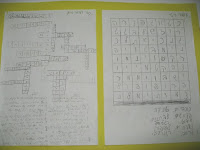Israel has a total of 51 gifted centers throughout the country. This past year, Kiryat Malachi became the center for part of the northern Negev, including Sederot, Kiryat Gat, Kiryat Malachi, and the Regional councils (county areas) of Yoav, Lachish, Shafir, Beer Tuvia, and Shaar Hanegev. (Hof Ashkelon used to be part of this group but now goes to the Ashkelon center. Maybe they will join LaRom in the future.) The previous regional center had been disbanded a few years before, and Kiryat Malachi was delighted to house the new program.
The Kiryat Malachi regional program called LaRom (to the top) is housed in the town science center.

Since the program had not existed in the area for a while, the decision was made to start just with 4th graders and to add a grade each year. Each Tuesday, youth in the top 1% come for a full school day. In the afternoon, from 4 to 6:45, children who tested in the top 5% go to this program program. Last year, approximately 40 attended the afternoon program, and already 60 entering 4th and 5th grades have signed up for the coming year. The groups meet once a week for thirty sessions.
Last year, this region was allowed to have students from the top 1.5% attend the morning program. Of the 31 who tested that high, 28 attended. They all will continue next year and two new 5th graders will be added. This year, 22 have tested into the morning program (of the approximately 2200 entering 4th graders in the cities and regions covered by LaRom), and all have already signed up. In a country where people often sign up for programs for children at the last moment, this, to me, is an astounding and very significant event.
Ariella Duvduvan, an experienced English teacher at AMAL high school, is the part-time director of this program.

She spends a bit more than 1/4 of her time on this program and the rest at a teacher at the high school. She is energetic, creative, enthusiastic, and has been able to bring together an amazing team of teachers who understand gifted and who have helped give this program a great reputation, after just one year.
Since science is not a focal point in most elementary schools in Israel, this program focuses on science and creative thinking. The students in the morning program choose three classes in different areas including buta not limited to pure science and ecology. The teachers for these hands-on courses are fantastic, and most are gifted themselves, many working on their Ph.D.s in their fields. Course include:
Marine Biology, Chemistry, Artificial Intelligence (Robots and Ethics), Robotics, Heroes in Films through History (and learn to critique films). The older group can take any of the already mentioned courses or the following also: Microbiology, How Things Work, Time Perception, Drawing, and Robotics. Ariella hopes that by the time the youth enter 7th grade, they can participate in a robotics contest sponsored by the Technion University. The youth in the afternoon choose two classes, which may include Astronomy, Biochemistry, Game Theory, Breaking the Code, and Drawing.
The youth have done some of the following:
experimenting with balloons filled with hot air
creating missiles from empty soda bottles
In their study of words, created word games

experimenting with toys with air and liquids inside
learned about sea life in ocean study



made robots from Lego kits and done a variety of things with them
Did different activities around the holidays including making creative objects out of fruit (without ruining the fruit for Tu B'Shvat
 (Fruit aliens from space)
(Fruit aliens from space)making very creative costumes for their Purim Party such as this dolphin costume made by one girl and her grandmother

Early in their program, their had an activity similar to musical chairs, in order to get to trust each other better. There was a slight variation: namely, no one could have his/her feet on the floor. But instead of having the extra child drop out, a chair was removed. At first, there was one more child than chairs. The next time there were 2 more children than chairs in each group, etc. By the time each group was down to two chairs, they had to be very creative, standing on chairs and hugging each other so as not to fall. In the end, the judge (Ariella) decided that the boys' group had one.


After this activity, two girls who had not gotten along seemed to have overcome their animosity through the activity.

The girls' group, however, appealed the decision in a formally written note to the judge. A fifteen-minute activity turned into three distinct lessons. The judge decided to review the events at a trial, and the two groups learned how to present their case in objective ways to the judge. (Israel does not have a jury system. Cases are tried by a single judge or a group of 3.) It was an amazing learning experience for all!
They had a variety of field trips including two to the Ilan Ramon Astronomy center in Beer Sheva. They went on a two-day trip to Eilat at the end of the year.


They studied ocean life and used the special microscopes at a college in Eilat.

They were the first students under college age to use this complicated, expensive microscopes. While they were there, they also dissected fish to see their insides, identified them, and then put them back together. Only one child was squeemish and let others do the dissecting!



At this time, very few children from Kiryat Malachi have qualified for this program. However, Ariella hopes that in the next few years she can add an after-school program for the top 20% of youth in Kiryat Malachi, so more children from this town can benefit from this amazing program and get turned on to science and the fun of learning.




No comments:
Post a Comment